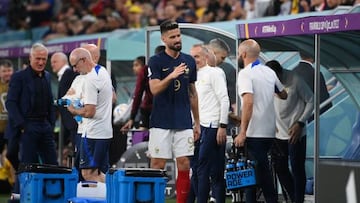WORLD CUP 2022
Who is on the staff of a World Cup team? Physical therapists, psychologists, trainers, etc.
What are the various jobs and roles involved in the backroom staff of a football team at the World Cup, and how do they help the coach and the players.

Most football fans like to discuss football and football strategy. Still, few of us know how many people outside the player roster are responsible for the team’s performance and functions inside this unit.
Practically that unit is conceived of different types of football, medical, and training performance specialists; also, in recent times, data scientists are making their place significant in the functioning of a premier-tier team.
World Cup news:
Where Japan and Saudi Arabia sit in the world
Nancy Faeser stands her ground, wears OneLove armband
The Assistant Manager
Assistant Manager is accountable for supporting the manager to keep day-to-day operations running. He serves as a temporary manager when the club has no official manager (e.g., when the manager is sacked or resigns from the club). He can provide information on the first team based on medical and injury reports, which players he thinks should be in the first eleven, and other information.
The Goalkeeping Coach
More than a self-explanatory role in the team. The goalkeeping coach will work mainly with the team’s goalkeeper to get them prepared for a match. A goalkeeping coach’s job is essential as they work with the isolated player throughout most of the game. They’ll make insights about the opposition’s strikers and see how they tend to play, informing the goalkeeper about their favored foot, whether they tend to shoot across goal or at the near post, and so on.
Chief Analyst
The performance analyst has become an integral part of the coaching team and provides the head coach with crucial information about opponents, often during a match or at half-time, about areas of the team and the opposition team that can help change the game. Another critical duty of the performance analyst is to thoroughly review the performance once the match is over, giving the coaching staff and players information about weaknesses – so they can be fixed – and strengths, which can be further evolved.
Fitness Coach
A fitness coach is a person trustworthy for the physical performance of the players. This role is not only about ensuring that each player is performing to their total physical capacity but also about developing a physical performance plan that is fully aligned with the coaching philosophy of the head coach.
Conditioning coaches develop programs and systems that make players stronger, faster, and more powerful. They can be considered similar to personal trainers, working with players individually to ensure that they improve their weaknesses wherever possible.
Chef / Nutritionist
The primary role of a sports nutritionist or dietitian is to educate players and support staff on how dietary strategies can enhance performance, recovery, and health. This is even more relevant in a domestic season that has paused to include the first winter World Cup, as footballers will have to extend their season by an additional four to eight weeks on top of their busy club calendars.
Physiotherapists
Physiotherapists work with players to help them recuperate from injuries or to ensure that previous injuries don’t appear again because of their work with the fitness or conditioning coaches. The fitness sections of the club will call upon them to help evaluate a player’s injury and capacity to work ahead of a match, amongst other things.
They will work closely with players during their recovery after an injury, ensuring that they don’t rush back too quickly and are doing appropriate exercises to help them recover as soon as possible.
Physios and team doctors also have an on-pitch role to quickly assess injuries to determine if a player can play on or should be substituted. Of course, a lot of the time, this is just done to waste time.
Masseur
A masseur helps players eliminate the waste product that tends to build up in the muscles during exercise, reducing swelling and helping to oxidize the muscles. They will also decide which type of massage is best for a player, usually opting for the soft-tissue variety but offering more stimulating varieties when necessary, enhancing recovery time.
Kit Manager
Kit manager responsibilities include taking care of player equipment. Things such as player jerseys, shoes, socks, and balls are all maintained and organized by him. Looking after the football boots is arguably the most critical role, given that players feel understandably precious about what they wear for football matches. The kit manager will work with the players to understand what they want from a football boot and how they want them to be prepared and recommend different spikes depending on their playing pitch quality.
Psychologist
Psychology in football is comprehensive because it covers many issues. It is one of the sports where the head has the most influence.
In professional football, the sports psychologist is just another sports psychologist. They are usually highly qualified people, with a great deal of training in their field and several years of sports training. Their work is fundamental, and although it is a relatively new branch in the beautiful game, they are already known to be more than necessary.
The sports psychologist must follow specific procedures not to interrupt the team dynamic and be able to carry out his therapies without affecting the training.









